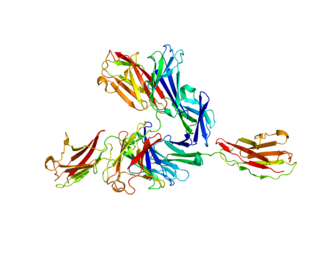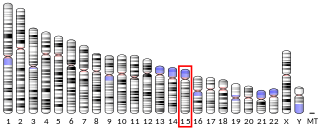Glucose transporter 3, also known as solute carrier family 2, facilitated glucose transporter member 3 (SLC2A3) is a protein that in humans is encoded by the SLC2A3 gene. GLUT3 facilitates the transport of glucose across the plasma membranes of mammalian cells. GLUT3 is most known for its specific expression in neurons and has originally been designated as the neuronal GLUT. GLUT3 has been studied in other cell types with specific glucose requirements, including sperm, preimplantation embryos, circulating white blood cells and carcinoma cell lines.

Basigin (BSG) also known as extracellular matrix metalloproteinase inducer (EMMPRIN) or cluster of differentiation 147 (CD147) is a protein that in humans is encoded by the BSG gene. This protein is a determinant for the Ok blood group system. There are three known antigens in the Ok system; the most common being Oka, OK2 and OK3. Basigin has been shown to be an essential receptor on red blood cells for the human malaria parasite, Plasmodium falciparum.

Excitatory amino acid transporter 1 (EAAT1) is a protein that, in humans, is encoded by the SLC1A3 gene. EAAT1 is also often called the GLutamate ASpartate Transporter 1 (GLAST-1).

Excitatory amino acid transporter 2 (EAAT2) also known as solute carrier family 1 member 2 (SLC1A2) and glutamate transporter 1 (GLT-1) is a protein that in humans is encoded by the SLC1A2 gene. Alternatively spliced transcript variants of this gene have been described, but their full-length nature is not known.

Excitatory amino acid transporter 3 (EAAT3), is a protein that in humans is encoded by the SLC1A1 gene.

Monocarboxylate transporter 5 is a protein that in humans is encoded by the SLC16A4 gene.

Monocarboxylate transporter 8 (MCT8) is an active transporter protein that in humans is encoded by the SLC16A2 gene.

Sodium- and chloride-dependent glycine transporter 1, also known as glycine transporter 1, is a protein that in humans is encoded by the SLC6A9 gene.

Zinc transporter 4 is a protein that in humans is encoded by the SLC30A4 gene.

Solute carrier family 15, member 2, also known as SLC15A2, is a human gene.

Monocarboxylate transporter 4 (MCT4) also known as solute carrier family 16 member 3 is a protein that in humans is encoded by the SLC16A3 gene.

Sodium-coupled monocarboxylate transporter 1 is a protein that in humans is encoded by the SLC5A8 gene.

Solute carrier family 13 member 3 also called sodium-dependent dicarboxylate transporter (NaDC3) is a protein that in humans is encoded by the SLC13A3 gene.

Monocarboxylate transporter 1 is a protein that in humans is encoded by the SLC16A1 gene. It is a proton coupled monocarboxylate transporter.
The monocarboxylate transporters, or MCTs, are a family of proton-linked plasma membrane transporters that carry molecules having one carboxylate group (monocarboxylates), such as lactate and pyruvate, across biological membranes. MCTs are expressed in nearly every kind of cell.

Monocarboxylate transporter 10, also known as aromatic amino acid transporter 1 and T-type amino acid transporter 1 (TAT1) and solute carrier family 16 member 10 (SLC16A10), is a protein that in humans is encoded by the SLC16A10 gene. SLC16A10 is a member of the solute carrier family.

Monocarboxylate transporter 9 is a protein that in humans is encoded by the SLC16A9 gene.
The lactate shuttle hypothesis was proposed by professor George Brooks of the University of California at Berkeley, describing the movement of lactate intracellularly and intercellularly. The hypothesis is based on the observation that lactate is formed and utilized continuously in diverse cells under both anaerobic and aerobic conditions. Further, lactate produced at sites with high rates of glycolysis and glycogenolysis can be shuttled to adjacent or remote sites including heart or skeletal muscles where the lactate can be used as a gluconeogenic precursor or substrate for oxidation.

Monocarboxylate transporter 3 (MCT3) also known as solute carrier family 16 member 8 is a protein that in humans is encoded by the SLC16A8 gene. MCT is a proton-coupled monocarboxylate transporter. It catalyzes the rapid transport across the plasma membrane of many monocarboxylates such as lactate, pyruvate, branched-chain oxo acids derived from leucine, valine and isoleucine, and the ketone bodies acetoacetate, beta-hydroxybutyrate and acetate. It also functions as high-affinity pyruvate transporter.

The proton-coupled folate transporter is a protein that in humans is encoded by the SLC46A1 gene. The major physiological roles of PCFTs are in mediating the intestinal absorption of folate, and its delivery to the central nervous system.

















